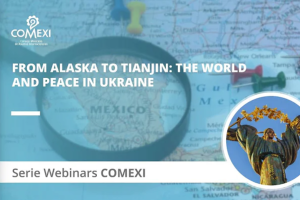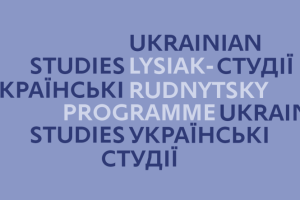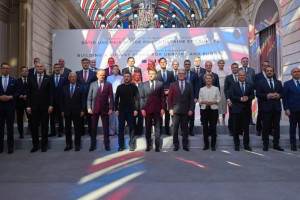Ukraine is still a serious challenge to the European Union

How to support Ukrainian civil society efficiently? This question, after the last election in Ukraine, seems to be more than significant. Controversial electoral process and the voting results show, that the Europeans should be actively involved in promoting democratic values in Ukraine.
A few days after the elections in Ukraine, and also on the day, when ministers of foreign affairs of the EU were debating in Brussels about the EU-Ukraine future, the Institute of Public Affairs, together with the Ilko Kucheriv Democratic Initiatives Foundation (DIF), organized an expert round table focused on the possibilities of supporting Ukrainian civil society.
 “The observers agreed that the elections were a step backward in the field of democratic development of Ukraine”, said Iryna Bekeshkina, Director of the Ilko Kucheriv Democratic Initiatives Foundation. Among the negative trends, which got stronger as a result of the electoral process, Bekeshkina stressed: restriction of human rights and freedoms, usage of selective justice, construction a Russian “managed democracy” model in Ukraine and growth of corruption. In Bekeshkina`s opinion, there are few positive trends to be noticed, merely: the consolidation of opposition forces, civil society activation and the readiness of citizens to defend their votes.
“The observers agreed that the elections were a step backward in the field of democratic development of Ukraine”, said Iryna Bekeshkina, Director of the Ilko Kucheriv Democratic Initiatives Foundation. Among the negative trends, which got stronger as a result of the electoral process, Bekeshkina stressed: restriction of human rights and freedoms, usage of selective justice, construction a Russian “managed democracy” model in Ukraine and growth of corruption. In Bekeshkina`s opinion, there are few positive trends to be noticed, merely: the consolidation of opposition forces, civil society activation and the readiness of citizens to defend their votes.
DIF director, while mentioning possible dangers for democracy development, paid attention especially to opposition repressions, creation of authoritarian power system, reduction of parliament’s role, governmental control over judiciary, persecution of non-governmental organizations, creation of pro-governmental “civil society”, restriction on human rights and freedom of speech and finally isolation from Western democracies.
“To improve democratic tendencies in Ukrainian society, we should educate it. This allows Ukrainians to become more and more aware as citizens, and further promote European values in Ukraine” – recommended Bekeshkina. The other valuable action might be encouraging political parties, or even putting pressure on them, to reorganize their structures to become more democratic.
Assistance for Ukraine, in Bekeshkina’s opinion, should be focused on:
- Supporting NGOs, which gained positive opinions in the society during the elections. Positive value of these organizations should be created on the basis of their potential in order not to let them disappear. Supporting projects of these organizations is also crucial.
- Supporting actions, which lead to decreasing dissonance between the Eastern and Western part of Ukraine.
- Supporting independent media.
- Bringing help to NGOs as well as social activists, who have been previously victimized.
Experts, taking part in the debate, agreed that we should build on the potential of those NGOs, which were efficient during monitoring the election campaign. But also, we should be aware of NGOs losing the contact with citizens.

“According to the research, opinion of 78% of Ukrainians is formed through internet media and television. Especially the last one, which is controlled by the government. That is why, apart from bringing help to organizations that are concerned with democratization of Ukraine, there should also be a focus on encouraging independence of media sector”, reckoned Piotr Kaźmierkiewicz, an expert from the Institute of Public Affairs.
The members of the meeting agreed, that the European Union should support the non-governmental organizations more effectively and support those experts, whose knowledge and propositions might be of use to the Ukrainian government. Otherwise, there won’t be any significant reforms in Ukraine. Furthermore, the EU governments should insist on permanent maintenance of democratic norms and standards in Ukraine. For the present, the EU hasn’t stated such demands rather often, but this should be the main task for Polish politicians. Furthermore, the president of the Institute of Public Affairs, Jacek Kucharczyk, stressed the necessity of better communication between EU members: ``The EU has to speak as a single actor, because current lack of understanding inside the EU hinders the encouragement of a Ukrainian shift to the democratic side”.
 The debate was organized within the framework of the project “Strengthening the capacity of Ukrainian NGOs to absorb international assistance – review of capacity gaps and need for international support”, realized by the IPA and the DIF. The project was realized thanks to financial support of the Local Government and Public Service Reform Initiative (LGI), the Batory Foundation in conjunction with the International Renaissance Foundation under the “East Beyond Borders” program.
The debate was organized within the framework of the project “Strengthening the capacity of Ukrainian NGOs to absorb international assistance – review of capacity gaps and need for international support”, realized by the IPA and the DIF. The project was realized thanks to financial support of the Local Government and Public Service Reform Initiative (LGI), the Batory Foundation in conjunction with the International Renaissance Foundation under the “East Beyond Borders” program.








